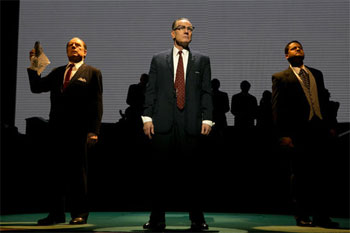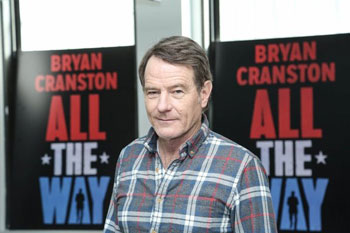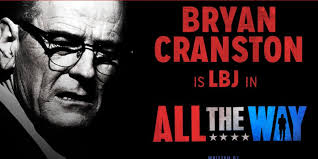A Compelling Bio-Play About The Life Of Lyndon B. Johnson And Other Historical Figures, All The Way, Opens On Broadway Starring Bryan Cranston.
Bio-Play About Lyndon B. Johnson Opens on Broadway

All the Way, Robert Schenkkan’s bio-play about Lyndon B. Johnson, opened last week at Broadway’s Neil Simon Theatre. After Bill Rauch, the artistic director of the Oregon Shakespeare Festival, directed its premiere at OSF in 2012, he partnered with Diane Paulus of the American Repertory Theater to mount the political drama this past fall for a limited engagement in Boston.
Further to this, he partnered with the commercial producer Jeffrey Richards to bring it to Broadway, where previews began on February 10, 2014. At A.R.T. as well as now on Broadway, the role of Lyndon Johnson is played by Bryan Cranston, whose fame has recently skyrocketed due to his starring role as Walter White on AMC’s Breaking Bad.
The Talented Team Of "All The Way"
Between Cranston’s viscerally talented portrayal of Johnson, Schenkkan’s masterfully realistic script, and Rauch’s poised and polished direction of the ensemble cast, All the Way received wide critical praise and is stirring a lot of buzz among theatregoers. The Pulitzer Prize-winning playwright Robert Schenkkan has declared the play to be the first half of a two-part series, with its action focused on the years leading to the passing of the Civil Rights Act of 1964.
As exemplified by the biographer Robert Caro’s lifelong project to chronicle Johnson’s career in what will be five massive volumes, the story of LBJ is a rich and detailed one.
An Inside Look Into The Lives Of Historical Figures
It therefore makes sense that Schenkkan would choose to break up his story into two plays. All the Way, in focusing on the years 1963-4, includes not only Johnson’s perspective, but also gives us an inside look into the experience of Martin Luther King, Jr. (played by Brandon J. Dirden), Coretta Scott King (played by Roslyn Ruff), J. Edgar Hoover (played by Michael McKean), Senator Hubert Humphrey (played by Robert Petkoff), Governor George Wallace (played by Rob Campbell), Robert McNamara (played by James Eckhouse), Senator Strom Thurman (played by Christopher Gurr), and Johnson’s long-time aide Walter Jenkins (played by Christopher Liam Moore).
This is therefore a democratic portrayal of history, with insight not only into the presidential podium but also the experience of African Americans as well as homosexuals during the time period.
Robert Schenkkan’s Masterful Script

As for the latter, Christopher Liam Moore – who is the real-life partner of director Bill Rauch, as well as the only cast member to remain from the original Oregon production – plays Walter Jenkins, whose tragic story is honored by Schenkkan’s inclusion of his narrative, though it could easily be over-shadowed by the other events of this dynamic era.
Weeks before the 1964 political election, Jenkins was caught in an elicit act with another man in the public restroom of the YMCA. Though Jenkins was forced to resign and leave Washington, Johnson never faltered in his support of his close friend, showing the man’s compassion despite his rough political exterior.
Compelling Broadway Experience
It is the presence of tales like this one alongside major political events that make Schenkkan’s play a personal and compelling theatrical experience. Marilyn Stasio in Variety called the play’s style “Expressionism Lite,” referring to how the characters are not entirely realistic, nor fully caricatured, with the one exception of Cranston’s LBJ who succeeds in feeling fully authentic.
This is to the play’s credit, for it is a tricky balance to fictionalize history onstage, and the blend between rigorous detail and abridgment helps the audience to navigate this complex tale. The cohesion of the piece also stems from Rauch’s clever direction, which stylizes the story just enough to make it artful while allowing the actors to exercise a grounded approach to their characters.
Cranston Praised For Enthralling Portrayal

The cast of 20 remain in sight, either sitting on upstage benches designed by Christopher Acebo or by marching through the aisles of the theatre. This lends the show a vibrant energy and a structural integrity.
Johnson is known as a great manipulator, and this play allows us to see his Machiavellian expertise. Bryan Cranston embodies the towering figure of Johnson despite his less-than-enormous height, partially with the help of hidden risers in his shoes, but more so due to his ferocious energy and commitment to the character.
"All The Way" Receives Rave Reviews
Throughout the play, we see how Johnson bent Congress to his needs, which in this case was to pass the Civil Rights Act of 1964. On the other hand, we also see how the black freedom fighters acted as a counterbalance to Johnson’s own agenda, as they make up a significant part of his constituency, and we are given an inside look into Martin Luther King, Jr.’s own political savviness.
Alongside NAACP director Roy Wilkins (played by Peter Jay Fernandez) and the SNCC head Stokely Carmichael (played by William Jackson Harper), we see the other side of the story of the passing of the Civil Rights Act, allowing for a balanced take on this historic struggle. Despite its rave reviews, All The Way has not yet been selling out its houses.
Competitive Broadway Marketplace
Last week, it averaged an audience capacity of 81.94% with an average paid admission of $79.04, grossing a total of $736,790 for the week. With the reviews having determined it to be a skillful and entertaining production, the audiences may become more confident in their choice to see their beloved Cranston in his Broadway debut in such a competitive Broadway marketplace. As the post-opening numbers start coming in, we will soon see if this becomes a commercial as well as a critical success.


